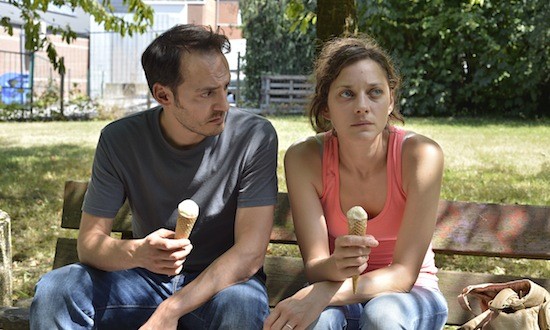
Fabrizio Rongione and Marion Cotillard in Two Days, One Night
The premise of Jean-Luc and Pierre Dardenne’s Two Days, One Night is as impersonal and blankly bottom-dollar as a pink slip: “16 pieces of paper. Pick ‘Sandra or bonus’ and put it in the box.”
So it goes for the working-class heroes and villains who populate the world of Belgium’s Jean-Pierre and Luc Dardenne, the internationally acclaimed sibling writer-producer-director-collaborators who have yet to make an uninteresting or irrelevant feature. It’s both fair and wrong to complain that Two Days, One Night is another one of their timely meditation on the myriad ways capitalism and Big Business grind up and discard the little guys nobody notices; after all, nobody complains about people seeking revenge in movie after movie. However, the Dardennes’ latest film differs from previous works in both storytelling style and star power. It lacks the itchy and anxious momentum of 2011’s The Kid With A Bike or 2008’s Lorna’s Silence; its rhythms mirror Sandra, its depressed and beaten-down protagonist, who slowly shuffles forward on her quest to win support from her co-workers in a fog of druggy, dolorous resignation that occasionally lifts during brief, clumsy surges of violence.
And this time the Dardennes got themselves a ringer for their nosy and unsparing handheld camera. The actress playing Sandra isn’t some non-professional discovery or some capable, obscure European craftsperson; she’s Oscar winner and Christopher Nolan mainstay Marion Cotillard. But Cotillard’s presence is not as distracting as it could have been. She strips herself of all glamour with some shrugs of her shoulders, some slow blinks of her eyes, and a general inertness that, oddly, equips her for doing all those normal things the normal people in Dardenne brothers movies do—checking on dinner in the oven, sleeping through a ringing phone, or staring out the passenger-side window of an automobile while her husband (Fabrizio Rongione, so naturalistic he practically disappears into the breakfast nook) drives her around.
The film is sort of suspenseful because all the Dardennes’ films are sort of suspenseful. It’s also slow, spacy, stultifying. Except for two songs overhead on a car radio, there’s no music to speak of; moments of disappointment and moments of compassion almost feel equivalent. In a few ways, Two Days, One Night is like a grown-up version of Rosetta, the Dardennes’ 1999 film about a young girl so desperate to get a job that she’ll rip off and double-cross anyone who stands in her way. This time it’s about a grown woman so desperate to keep her job that she’ll beg others to take one for the team.
The subtext of Sandra’s interactions with her co-workers, and the main subject of the film, is responsibility. Who’s to blame for this situation? What can I do to help? And how can I do that without harming my own chances for success? One of the great and troublesome tasks of human existence is trying to figure out the limit of your own actions. At what point do your behaviors stop being your own and become mere reactions to a larger system designed to make you act in this way? There aren’t any simple answers in the film, which might be another way of saying there aren’t any answers at all.